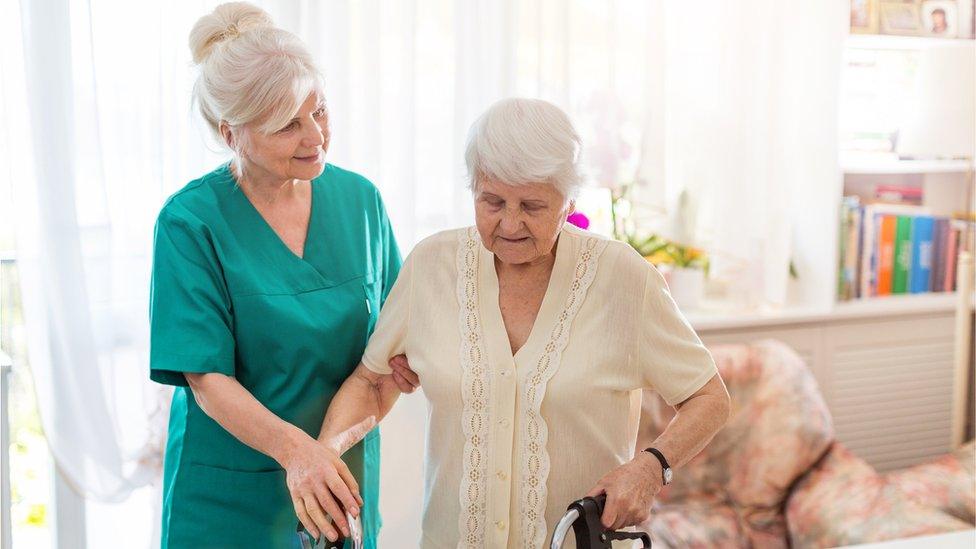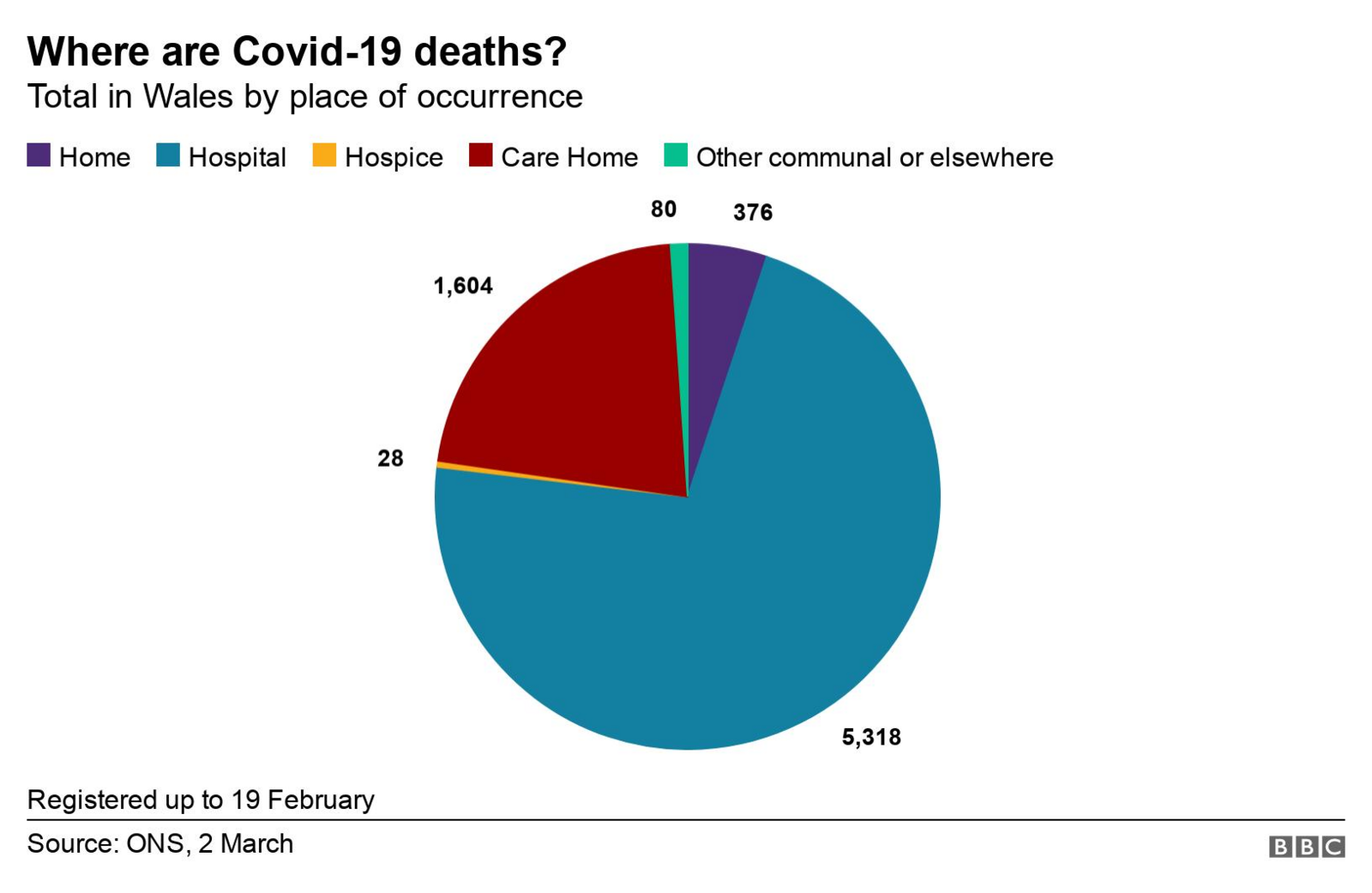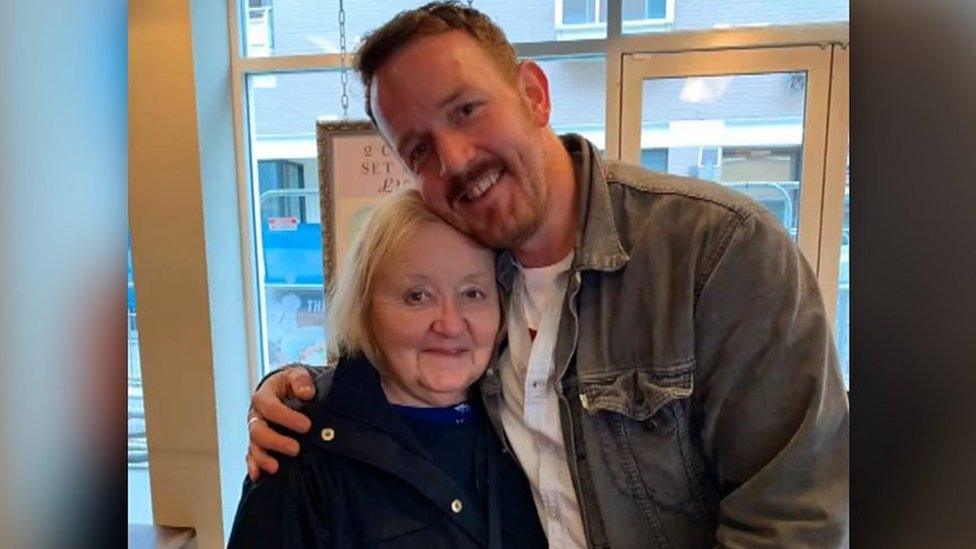Covid in Wales: Care home owner trying to keep 'head above water'
- Published
Lakshmy Pengelly: "It felt like we we were drowning"
A care home owner says she is trying to keep her "head above water" after a significant fall in occupancy levels during the pandemic.
Data obtained by BBC Wales Live has found in parts of Wales the number of care home residents has dropped by more than 20% compared with February 2020.
Lakshmy Pengelly, who owns a home in Llanelli, said she was relying on savings which were "running out".
The Welsh Government said a fund would be in place for another six months.
Care Forum Wales, which represents care home owners, has warned "the whole infrastructure of social care in Wales" could be under threat without financial support.
Overall - based on data from 15 of Wales' 22 councils - the number of occupied places in adult care homes has fallen by 13% from 15,190 to 13,188.
The biggest declines were seen in Blaenau Gwent (26%), Newport (21%), Bridgend (21%) and Rhondda Cynon Taf (21%).
The data covers all residential care and nursing homes for adults and the elderly.
Mrs Pengelly, who owns Ashley Court care home, said they managed to stay virus-free until the week before Christmas, just before residents and staff were due to receive the Covid vaccine.

More than 14,300 (95%) care home residents have received their first Covid jab in Wales
A total of 24 residents caught the virus and seven died with it and Mrs Pengelly said it was "such a tough time" for residents, their families and staff - and added she was now concerned about the home's future.
'I pray it's going to be over soon'
"We've been fortunate enough to be a home that's always full, the lowest we've ever dropped to is about 80% occupancy," she said.
"Normally throughout the year we maintain 95% status. This year we are just below 60%.
"As a business we've always put money aside as a contingency. But that contingency is actually starting to run out.
"We've gone nearly a year now and I think we can't do any longer. I just pray that it's all going to be over soon because, we're just trying to keep our heads above water."
As the vaccine rollout continues, Mrs Pengelly said she hoped demand would return.
'Loss of confidence'
"In some terms I think it's a pause button because people will always need care homes," she said.
"There is a loss of confidence at the moment in putting families in care homes because of the way Covid spread through care homes.
"We can't see mum unless she has hours to live"
"But there's also the fact that people are off work so maybe they're able to take care of their parents or grandparents.
"But then once society goes back to normal and everybody is back in work they're going to have to start relying on the care homes again."

Cathy Gale, whose mother Jean is a resident at Cartref Residential Care Home in Cardiff, said the family would have "really struggled" if her mother was not in a home during lockdown.
Ms Gale said her mother was unable to live alone due to memory loss and decreasing mobility and it was her decision to move into the home.

Jean Gale's family said her mother's care home keeping things "normal" had made them grateful
"My mam has always been a really independent person and it was her decision she asked us to find somewhere close to me where she can live and we really haven't looked back," she said.
"She has got that bit of independence and she is a very sociable person so not being able to go out was really isolating for her.
She said that where her mother was now meant "she has the friends and the carers around her that are like a second family".
She said the home had kept services running relatively normally, offering events for Christmas and the Six Nations.
There have been a total of 1,604 Covid-19 deaths in care homes up to 18 February, making up 21.7% of all coronavirus deaths in Wales.
Care Inspectorate Wales (CIW) figures show there have been 34% more care home deaths since March 2020 than in the same time period the year before.
Mary Wimbury, from Care Forum Wales, said they had been hit by a "double whammy of soaring costs and plummeting income".
She said detail from the Welsh Government on the extension of a hardship fund for care homes was needed "as soon as possible".
"It's absolutely vital if we're to keep the sector sustainable in any way that the hardship fund continues because we're not going to have seen the end of the pandemic by the end of March," she said.
"If average occupancy drops to 85% or even below, the whole of the infrastructure of social care in Wales would be under genuine threat without this vitally important support."
What does the Welsh Government say?
The Welsh Government said it was "very grateful for the hard work and dedication" of social care providers in Wales looking after care home residents during the pandemic".
"We recognise there are additional financial pressures - these are currently supported through our hardship fund," said a government spokesman.

A SIMPLE GUIDE: What are the symptoms?
IN-DEPTH: Coronavirus pandemic
VACCINE: How will the UK deliver the jabs?
IMMUNISATION: What are the Covid vaccine differences?

"More than £88m has been distributed to date, with existing provisions extending to the end of the financial year.
"The Welsh Government's final budget for 2021-22 confirms continuing support for social care providers through the Local Authority Hardship Fund during the first six months of the new financial year in order to help meet costs arising as a result of the pandemic."
In its 2021-22 budget, the government said it would "build on" the hardship fund by providing an additional £206.6m to support local government for the first six months.
But the funding is intended to go towards things including additional funding for term-time free school meals, adult social care, care home testing, school cleaning, excess deaths management, self-isolation payments, and homelessness support.
Watch BBC Wales Live on BBC One Wales on Tuesday at 22:35 GMT and then on BBC iPlayer
- Published7 February 2021

- Published16 December 2020

- Published23 February 2021
